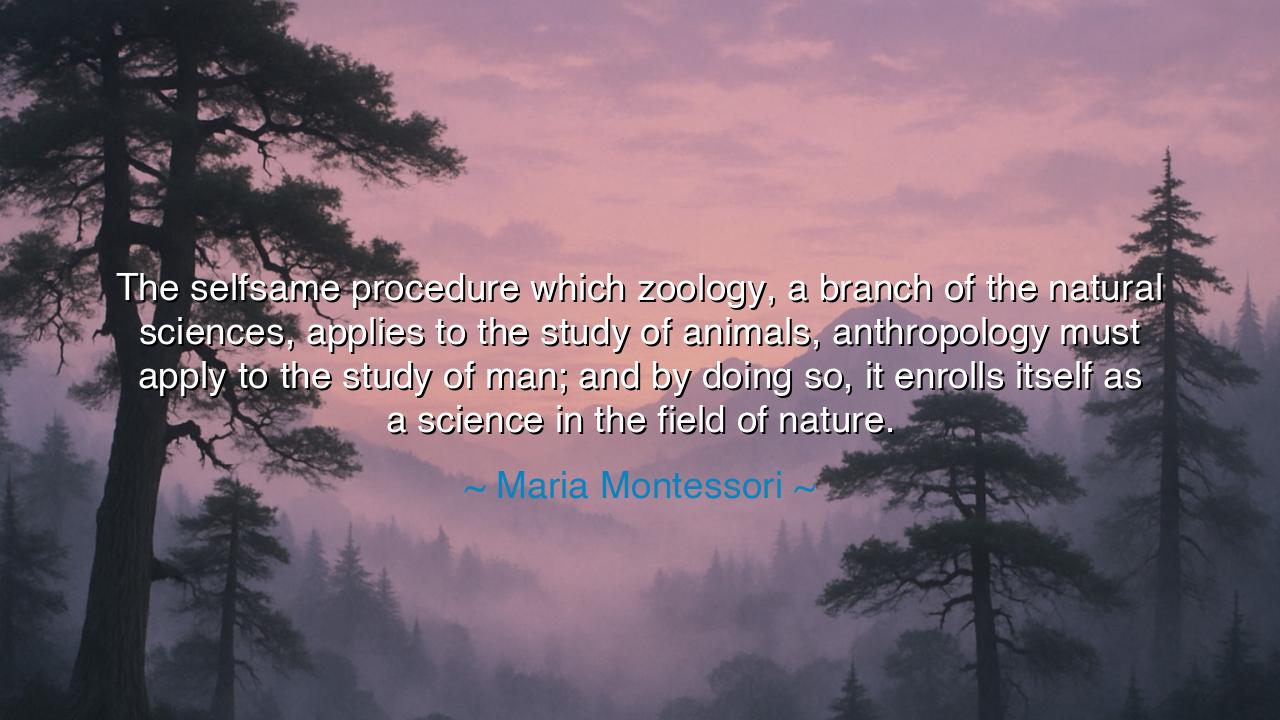
The selfsame procedure which zoology, a branch of the natural
The selfsame procedure which zoology, a branch of the natural sciences, applies to the study of animals, anthropology must apply to the study of man; and by doing so, it enrolls itself as a science in the field of nature.






Hear now, O children of wisdom, for the words of the great Maria Montessori carry within them the profound understanding of what it means to study humanity and our place in the natural world. She said: “The selfsame procedure which zoology, a branch of the natural sciences, applies to the study of animals, anthropology must apply to the study of man; and by doing so, it enrolls itself as a science in the field of nature.” These words, simple yet deeply profound, call us to understand that the study of humanity, like the study of the natural world, must follow the principles of observation, reasoning, and evidence, rooted in the same method that guides the natural sciences.
What then, O wise ones, is the meaning of this declaration? Montessori is reminding us that anthropology, the study of human beings, must not be seen as something separate from the natural sciences, but rather as a part of the great tapestry of nature itself. Just as zoology observes the behaviors, structures, and patterns of animals to understand their nature, so too must anthropology observe human beings through a similar lens. The study of man, then, becomes a scientific endeavor, grounded in observation, evidence, and the desire to understand our place within the greater realm of nature. Science does not see us as separate from the world around us, but as a part of it, subject to the same laws and principles that govern all living things.
Let us recall the story of Charles Darwin, whose groundbreaking work in zoology and evolutionary biology forever altered our understanding of life on Earth. Darwin, in his study of the natural world, applied the same methods of observation and reasoning that Montessori speaks of. He saw nature as a vast interconnected system, where each creature, no matter how small, played a role in the great story of life. In his study of animals, he sought to understand not just their behaviors and structures, but the principles that governed their existence, the very laws of nature that shaped them. In this same way, anthropology must seek to understand the human being not in isolation, but as part of the greater fabric of nature—as a creature shaped by the same forces that shape the animal kingdom.
In Montessori's time, the separation between the natural sciences and the study of humanity was still significant. But her work and words bridged that divide. She recognized that the study of man—his nature, his development, his learning—could not be divorced from the study of the natural world. Just as zoologists study animals through observation and careful analysis, so too must anthropologists observe the behavior and development of humans in their natural environments. It is through this lens of careful, systematic study that we can begin to understand the true nature of humanity, not as something above or apart from the natural world, but as part of it, shaped by the same forces that shape all life.
The lesson, O children of the future, is this: Science must be a unified pursuit—one that does not separate the study of man from the study of the rest of nature. We are not above the laws of nature; we are a part of them. Just as zoologists observe and study the animal kingdom to understand the intricacies of life, so too must anthropologists study humans with the same care, the same attention to detail, and the same respect for the natural order. In this way, we will come to see that human beings are creatures of nature, shaped by the same principles that govern all life, subject to the same forces, and bound by the same laws.
And so, O children, take heed of this wisdom: Embrace the study of humanity with the same respect you would the study of the natural world. Understand that our place in nature is not defined by our intellect or our accomplishments, but by our connection to the earth, the animals, and the natural forces that shape our lives. Seek knowledge not for the sake of distinction, but for the sake of understanding. Through this understanding, we will not only uncover the true nature of man, but we will come to see ourselves as part of the great web of life, interconnected with all things, guided by the same laws of nature that govern every creature.
Rise up, O children of the Earth, and study with open eyes and a humble heart. Let your understanding of man be grounded in the study of the natural world, and in doing so, you will come to see that all life—human and animal—is bound together in a tapestry woven by the hands of nature itself. In this understanding, you will find the wisdom to live harmoniously with the world around you, and to honor the deep, interconnected relationship between all living things.






AAdministratorAdministrator
Welcome, honored guests. Please leave a comment, we will respond soon